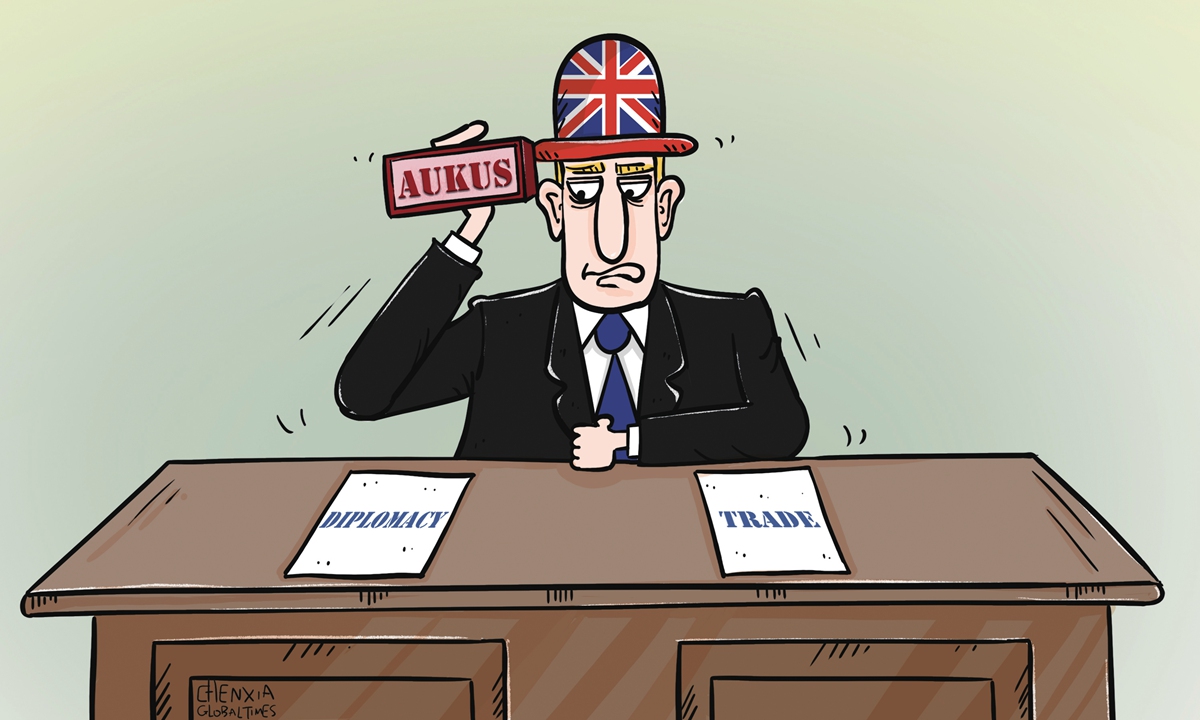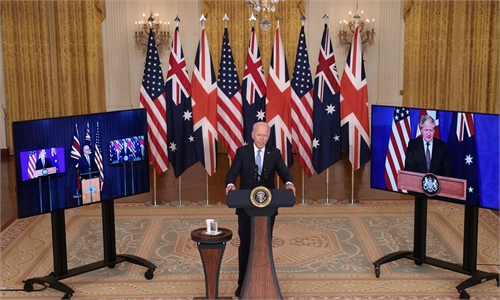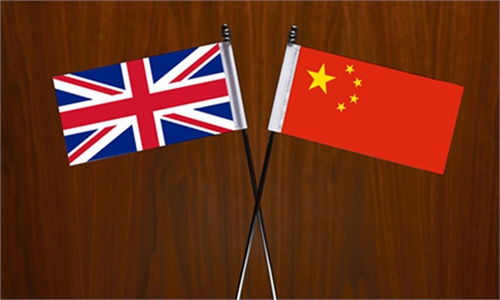
Illustration: Chen Xia/Global Times
The UK could become a big uncertain factor in the so-called Indo-Pacific in the future, because it very likely carries out some proactive strategies in the region. According to a Financial Times report on Sunday, Liz Truss, the new UK foreign secretary, is plotting a reset of the UK's foreign and trade policy to make further security and technology pacts "in the style of" the AUKUS nuclear submarine deal among Australia, the UK and the US.
"Truss is eyeing further security and trade ties in the Indo-Pacific region, with India, Japan, Indonesia, as well as Australia, among those countries with which she will aim to build better ties," the report read.
Britain mainly regards two regions as its strategic priorities: the Atlantic, and the Indo-Pacific region. As for the Atlantic, the UK aims at strengthening cooperation with the US. Regarding the Indo-Pacific region, the UK will take the initiative to act proactively. Truss said on October 3 that Britain would forge closer ties with, "allies like the G7, NATO, Japan and Mexico, South Korea, India, Israel, the Gulf states" and those countries that "escaped" the former Soviet Union and "fought for freedom."
This shows that the UK will still stick to the political principle of the so-called value alliance. It means that London aspires to reach the goal of the Global Britain vision.
In a short time, it will be difficult for the UK to exert influence on the Indo-Pacific region through trade and investment means. Its efforts will be to some extent limited in security and military fields to serve its diplomatic goals. After divorcing from the EU, British economic influence could hardly match that of the EU in the Indo-Pacific region. Therefore, it cannot be ruled out that London will deliberately intensify its military and security efforts in the region.
The UK is eager for quick gains in boosting its influence in the Indo-Pacific region. On the other hand, AUKUS-style deals will bring the country more economic benefits.
The so-called AUKUS style can be viewed as small-circle partnership. It means the UK may give up comprehensive, larger multilateral diplomacy and security construction in the future, and focus on a few specific fields and small circles. In years to come, the UK is likely to move to establish small combinations in its periphery among the "D10" club of democratic partners. UK's outreach might match with US' Indo-Pacific Strategy.
In March, before coming into office as UK foreign secretary, Truss urged WTO to be reformed to "get tough on China." In its China policy, Britain tried to use economy and trade to balance possible disputes in the political and security field. But judging from Truss' words, the so-called balance seems to be changing.
Now, since Truss is "eyeing further security and trade ties in the Indo-Pacific region," what is China's position to interact with the UK's strategic considerations? This requires the UK to take the initiative to communicate with China - and to date, it has not done enough in this regard.
The approach that the UK will take to build its presence in the Indo-Pacific region and which countries it will choose to partner with may have an impact on China. For example, if the UK focuses too much on military cooperation, it will negatively influence the security environment in the region.
Although there are some potential conflict points in the Indo-Pacific region, China and many regional countries are still able to manage and control them. But if the UK deliberately creates conflicts that will inevitably cause more hidden security issues in the region. That will entail more uncertainties.
Some claim that the UK cannot bypass China to engage in the Indo-Pacific region. If the UK expands the AUKUS style to engage other partner countries, it will undoubtedly have an impact on China's technological and industrial chain. And, if the UK deliberately chooses countries that once had conflicts with China as its partners, such as India and Japan, the negative impact on China may be magnified.
The author is director of the Department of European Studies, China Institute of International Studies. opinion@globaltimes.com.cn


